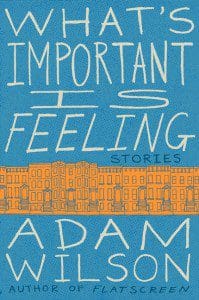 What’s Important Is Feeling (Harper Perennial, 198 pages), the new collection of short stories by Adam Wilson, begins with a few lines from Denis Johnson’s poem “Enough”: “as if we held in the heavens of our arms/not cherishable things, but only the strength/ it takes to leave home and then go back again.”
What’s Important Is Feeling (Harper Perennial, 198 pages), the new collection of short stories by Adam Wilson, begins with a few lines from Denis Johnson’s poem “Enough”: “as if we held in the heavens of our arms/not cherishable things, but only the strength/ it takes to leave home and then go back again.”
The push and pull of home—the fear of arriving unchanged, still incomplete—is an ever-present theme throughout Wilson’s fiction. His first novel, Flatscreen, told the story of Eli Schwartz, a stoner in his early 20s who lives at his parents’ house in a ritzy Massachusetts suburb, a young man without the drive to leave or to interact with the world. Many of the protagonists in What’s Important Is Feeling are similarly glum, dark-humored, and pill-addicted, but Wilson succeeds as he did in Flatscreen in giving them depth.
In “Things I Had,” the narrator ponders the roots of his failed marriage and his love of Latina women, finding some answers in his high school years. He is sixteen, living in a broken home. He’s enamored with Celia Escarole, frustrated sexually and socially, all while his grandfather is dying of Alzheimer’s in a small alcove above the garage.
“My grandfather was an old queen, and when he was dying he would grab me through my pants and try to make it hard. He had Alzheimer’s and called me Sam, and sometimes I let him because it wasn’t his fault and I liked the attention.”
The story that follows could have been a sick, dark confession. But it’s not. It’s a story about being half-grown and pissed off and not knowing exactly why. We don’t need to like Wilson’s characters to see ourselves in them.
Wilson manages to negotiate a sad story with a tenderness that forces the reader to think that maybe it will be all right, even when the overwhelming evidence points to the contrary. Partly it’s because despite his character’s lives being gritty, pained, and opaque, the writing never is. The color of the prose keeps the stories unexpectedly lively.
“Sluts at Heart,” also about a man in his twenties, presents us with a protagonist who lives with his girlfriend and their cat while his childhood friend is dying of cancer. Wilson frames the story around the “Young Elvis” versus “Vegas Elvis” postage stamp vote of 1992 and presents Simit, the childhood friend, as all too human—vulgar, horny, lovely. He is not Cancer Patient No. 4 on a CBS hospital procedural; he’s real and recognizable, with traits you sort of hate and are jealous of, but really love him for the most. As the narrator’s friends are getting married—“it was the year of people not making jokes”—it seems likely he will never be marrying his girlfriend. When he comes home from visiting Simit at his mother’s apartment—ambitions unfulfilled, not really in love, not quite anything—we recognize that all he really has is the strength to “leave home and go back again.” He is still unformed and troubled in life and love. But somehow, that’s as it should be.
Wilson employs an eclectic cast of characters throughout the collection—bankers the night before the market crash, film school buddies on a doomed set, college students in an empty college town over the summer—and he uses them to tell many different coming-of-age tales. But he is at his best when he deals in pills and depression and love. The book’s final story, “Milligrams,” is presented in twenty-one numbered sections, each anywhere from a paragraph to a full page in length. In the story, two addicts cook lobster and try to make love as they struggle to get to the end of the month when they can afford more OxyContin. Their apartment is a mess, and becomes central to the story when their dead roommate’s brother and friend arrive to collect his things. The fragmented yet linear narrative forces the reader to chart the darkening and mounting distrust of the narrator as his opiate withdrawal intensifies. The descriptions of dried skin, ripped couches, and a moldy, blood-stained bathroom are viscerally affecting. You want to turn away but find yourself rereading these harrowing passages.
What’s Important Is Feeling, with its tales of young men and women who can’t quite grow-up, is about addiction, fear, sickness, self-doubt, family and love. But it asks us to respect its dark and damaged characters and to come feel what they feel, even if it’s for just a moment in time.

One thought on “Troubled & Young, But That’s O.K.: Adam Wilson’s ‘What’s Important Is Feeling’”